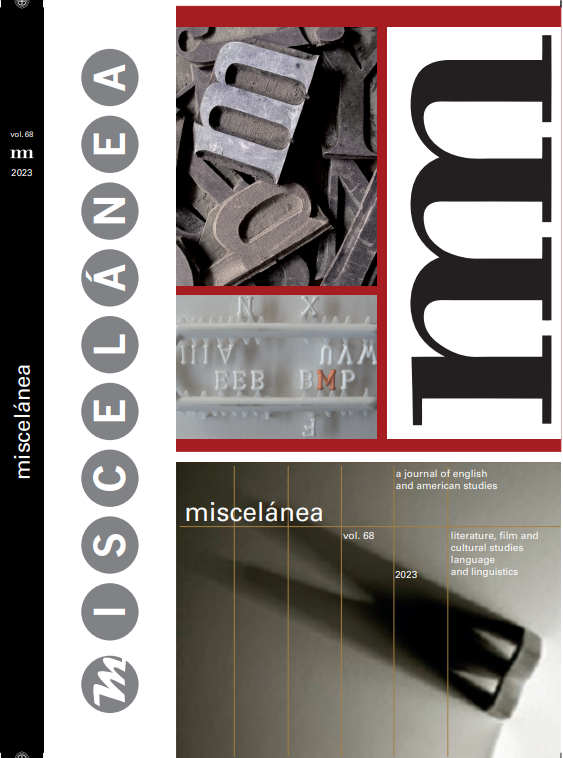“Sluts” and “Slaves”: Internet y la evolución de la fantasía en la obra digital de Dennis Cooper
DOI:
https://doi.org/10.26754/ojs_misc/mj.20236878Palabras clave:
Cooper, flarf, found language, literatura digital, fantasía, deseoResumen
Este artículo explora una parte hasta ahora poco investigada de la producción literaria de Dennis Cooper: sus publicaciones en blogs y, en particular, sus entradas
mensuales tituladas “Sluts” y “Slaves”, donde recopila textos e imágenes explícitas, y a veces sórdidas, de hombres trabajadores sexuales supuestamente encontrados en internet. En primer lugar, este trabajo situará estas publicaciones en el campo de la literatura citacional y online, argumentando que son un ejemplo de ‘flarf’. Al hacerlo, también amplía la noción de ‘flarf’ de la poesía a la narrativa. A continuación, este artículo explora las similitudes y diferencias entre las publicaciones en el blog y otras obras de Cooper, especialmente The Sluts (2005), para argumentar que, si bien similares en su interés en internet y la “imposibilidad de la verdad”, las publicaciones en el blog presentan una transformación significativa que obliga a los lectores a enfrentarse a sus propios deseos.
Descargas
Citas
Baker, Timothy B. 2012. “The Whole Is Untrue: Experience and Community in The Sluts”. In Hegarty, Paul and Danny Kennedy (eds.): 52-67.
Bauman , Zygmunt. 2000. Liquid Modernity. Cambridge: Polity Press.
Brantle y, Ben. 2014. “Karen Finley Relives the AIDS Epidemic in ‘Written Sand’”. The New York Times (October 14<https://www.nytimes.com/2014/10/16/theater/karen-finley-relives-the-aidsepidemic-in-written-in-sand.html>. Accessed September 4, 2023.
Brintnall , Kent L. 2012. “Transcribing Desire: Mystical Theology in Dennis Cooper’s The Sluts”. In Heinämäki, Elisa, P.M. Mehtonen and Antti Salminen (eds.) The Poetics of Transcendence. Berlin: Brill: 59-80. <https://doi.org/10.1163/9789401212090_005>.
Ciccoricco, David, Astrid Ensslin, Jessica Pressman, Hans Kristian Rustad , Jessica M. Laccetti and Alice Bell. 2010. “A [S]Creed for Digital Fiction”. Electronic Book Review (July 3, 2010). <https://electronicbookreview.com/essay/a-screed-for-digital-fiction/>. Accessed September 4, 2023.
Comitta , Tom. 2020. “A Brief History of Citational Fiction and the Literary Supercut”. LitHub(November 5, 2020). <https://lithub.com/a-brief-history-of-citational-fiction-and-the-literary-supercut/#:~:text=A%20citational%20fiction%20could%20read>.Accessed September 4, 2023.
Cooper, Dennis. 1991. Frisk. New York: Grove Weidenfeld.
Cooper, Dennis. 2005. The Sluts. New York: Carroll and Graft.
Cooper, Dennis. (ed.) 2007. Userlands: New Fiction Writers from the Blogging Underground. New York: Akashic Turnaround.
Dijk, Yra Van. 2015. “Amateurs Online: Creativity in a Community”. In Rettberg, Scott, Patricia Tomaszek and Sandy Baldwin (eds.) Electronic Literature Communities. Morgantown, WV: Centre for Literary Computing and ELMCIP: 45-68.
Epstein , Andrew. 2012. “Found Poetry, ‘Uncreative Writing’, and the Art of Appropriation”. In Bray, Joe, Alison Gibbons and Brian McHale (eds.) The Routledge Companion to Experimental Literature. London: Routledge: 310-322.
Férez Mora, Pedro Antonio. 2013. “Violence, Death, Sex and Psychoanalysis in Dennis Cooper’s The Dream Police”. Atlantis 35 (2): 81-98.
Férez Mora, Pedro Antonio. 2014. “Dennis Cooper’s ‘The Sluts’: Prosthetic and Performative (Homo) Sexuality”. ES: Revista de Filología Inglesa 35: 71-88.
Férez Mora, Pedro Antonio. 2022. “Eroticism as the Body without Organs in Dennis Cooper’s Frisk : Grand Narratives, Desire, and Infinity”. Textual Practice (March): 1-22. <https://doi.org/10.1080/0950236X.2022.2056760>.
Fisc her , Shell. 2009. “Can Flarf Ever Be Taken Seriously?” Poets and Writers (July/August). <https://www.pw.org/content/can_flarf_ever_be_taken_seriously>. Accessed September 4, 2023.
García-Iglesias , Jaime. 2022a. “‘We’re Just Fantasizing Aloud Here’: Fantasy and Online Communities in Dennis Cooper’s The Sluts (2005)”. English Studies 103 (4): 609-623. <https://doi.org/10.1080/0013838X.2022.2051919>.
García-Iglesias , Jaime. 2022b. “The New Owner and a Missing Author: Negotiating Authorship in Literary Creations of Online Subcultural Communities”. New Writing 19 (4): 376-390. <https://doi.org/10.1080/14790726.2021.1993265>.
García-Iglesias , Jaime. 2022c. The Eroticizing of HIV: Viral Fantasies. Health, Technology and Society. Cham: Springer International Publishing. <https://doi.org/10.1007/978-3-031-11352-9>.
Hayles, Katherine. 2008. Electronic Literature: New Horizons for the Literary. Notre Dame, Indiana: University of Notre Dame Press.
Hegart y, Paul and Danny Kennedy. (eds.) 2012. Dennis Cooper: Writing at the Edge. Brighton: Sussex Academic Press.
Hester , Diarmuid. 2020. Wrong: A Critical Biography of Dennis Cooper. Iowa City: University of Iowa Press.
Jacob, Benjamin. 2004. “Reading Obscenity”. PhD Disseration. Department of English and Related Literature, University of York, UK. <https://idp.nottingham.ac.uk/shibboleth-idp/profile/SAML2/Redirect/SSO?execution=e1s1>.
Kakutani , Michiko. 1996. “Designer Nihilism”. New York Times Sunday Magazine (April 21 <https://www.nytimes.com/1996/04/21/magazine/l-designer-nihilism-091707.html>. Accessed September 4, 2023.
Kennedy, Danny. 2012a. “Introduction”. In Hegarty, Paul and Danny Kennedy (eds.): 1-12.
Kennedy, Danny. 2012b. “Interview with Dennis Cooper”. In Hegarty, Paul and Danny Kennedy (eds.): 191-209.
Lethem, Jonathan. 2007. “The Ecstasy of Influence: A Plagiarism”. Harper’s (February). <https://harpers.org/archive/2007/02/the-ecstasy-of-influence/>. Accessed September 4, 2023.
Lev, Leora. 2006a. “Introduction: Enter at Your Own Risk: The Dangerous Art of Dennis Cooper”. In Lev, Leora (ed.) Enter at Your Own Risk: The Dangerous Art of Dennis Cooper. Cranbury, NJ: Fairleigh Dickinson U.P.: 15-41.
Lev, Leora. 2006b. “Sacred Disorder of the Mind: Sublimity, Desire Police, and Dennis Cooper’s Hallucination of Words”. In Lev, Leora (ed.) Enter at Your Own Risk: The Dangerous Art of Dennis Cooper. Cranbury, NJ: Fairleigh Dickinson U.P.: 200-224.
Lev, Leora. 2012. “Next: Vampiric Epistolary, Haunted Cyberspace, and Dennis Cooper’s Positively Mutant Multimedia Offsping”. In Hegarty, Paul and Danny Kennedy (eds.): 88-105. Lipovetsky, Gilles and Jean Serroy. 2007. L’Ecran Global : Cinéma et Culture-Médias à l’âge Hypermoderne. Paris: Seuil.
McHale, Brian. 2015. The Cambridge Introduction to Postmodernism. New York: Cambridge U.P.
Morrison, Aimée. 2013. “Blogs and Blogging: Text and Practice”. In Siemens, Ray and Susan Schreibman (eds.) A Companion to Digital Literary Studies. Oxford: John Wiley and Sons, Ltd.: 369-387. <https://doi.org/10.1002/9781405177504.ch20>.
Murray, Simone. 2015. “Charting the Digital Literary Sphere”. Contemporary Literature 56 (2): 311-339.
Shields, David. 2010. Reality Hunger: A Manifesto. New York: Alfred A. Knopf.
Sida hmed, Mazin. 2016. “Dennis Cooper Fears Censorship as Google Erases Blog without Warning”. The Guardian (July 14). <https://www.theguardian.com/books/2016/jul/14/denniscooper-google-censorship-dc-blog>. Accessed September 4, 2023.
Siemens, Ray and Susan Schreibman. (eds.) 2013. A Companion to Digital Literary Studies. Oxford: John Wiley and Sons, Ltd.
Tabbi, Joseph. (ed.) 2018. The Bloomsbury Handbook of Electronic Literature. Bloomsbury: London.
Young, Elizabeth and Graham Caveney. 1992. Shopping in Space: Essays on America’s Blank Generation Fiction. New York: Atlantic Monthly Press.
Descargas
Publicado
Cómo citar
Número
Sección
Licencia
Derechos de autor 2023 Jaime Garcia-Iglesias

Esta obra está bajo una licencia internacional Creative Commons Atribución-NoComercial 4.0.
Aceptado 2023-10-04
Publicado 2023-12-19


